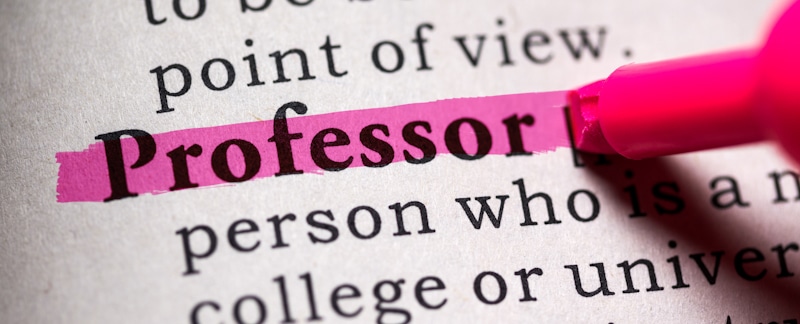A valid question for many people and students who must have had doubts when referencing their teachers in homework, press releases, recommendation letters, and other types of papers belonging to the educational world. This article will explore if it is necessary to capitalize the word professor when writing any of those materials.
Capitalization rules for this term are straightforward. You must only capitalize the title “professor” if it precedes a person’s name or if it is at the beginning of a sentence. Alternatively, if it is written after a name, it should be lowercase.
In this article, we will discuss everything you need to know in regards to capitalizing the term. Additionally, to have a better understanding, we will present examples. Keep reading!
Capitalizing “Professor” When Writing
When talking or writing about professions, titles are used to help differentiate among roles. When it comes to the academic context, it reveals the level of dedication, time, and money someone has decided to invest to be called in a specific way, in this case, the title “professor.” This title should not be used as a synonym for “teacher”; later on in this article,, we will view the clear difference between them. Titles help us distinguish one role from another, and in the academic world, they reveal how much hard work it takes to earn the right to refer to someone in a particular way.
Capitalizing the term “professor” is subject to English grammar-style references, like the AP Style, APA, The Oxford Guide To Style, MLA, and The Chicago Manual of Style. Overall, the term “professor” is a noun, and its capitalization depends on the place located within the sentence. Is it placed as a job description, or is it written as a title to address the individual directly?
Listed below are the rules for capitalizing the word “professor.”

Rules
- At the beginning of a sentence
This is the famous principle once learned in first grade. That basic English rule states that you should capitalize the word at the beginning of every sentence.
Example
- Professor Michaelson has been an excellent role model in terms of humbleness and wit.
- Professor Forthright has greatly impacted my days in college, and I will never be able to thank him enough for that.
- “Professor” is a noun that describes years of preparation; it is a title not given to any teacher.
In the first sentence, the word “professor” initiates the whole idea of describing in what terms someone is a role model of humbleness and wit. The second sentence doesn’t specify what type of professor Mr. Forthright is, but since the word is located at the beginning, it should be uppercased.
The third sentence is describing the noun itself; it doesn’t refer to someone specifically, but since it’s seen at the start of the verbal idea, it should be in capital letters in line with the previous sentences.
These examples above use the noun as a starter of a complete thought; this means that it works as the subject of our sentences too.
- When it precedes a person’s name, directly addressing the person
If it precedes a person’s name, it means that it is used as a title or a tag, not just describing the person’s job at any institution. If a person uses the noun “professor” as part of their title when people address them, it should be written in capital letters. Therefore becoming a proper noun.
Examples
- That man you see over there with the suit, briefcase, and European flare is Professor of Foreign Politics, Pierre Lamarche.
- Jen thought she had enrolled in the class of Distinguished Professor Marie Hassletow. Instead she enrolled in Professor Coulumb’s class.
- If you ever take Humanities, don’t miss the chance to register under Alexander Payton, Professor of Anthropology and Living Behavior. He really wants everyone in his lecture to learn.
When Not To Capitalize
Knowing the cases when you should avoid capitalizing will guarantee that the written work you deliver is of great quality grammar-wise. But also that the level of respect you desire to have when addressing someone with an academic title gets reached.
Following are the cases where you shouldn’t capitalize the noun “professor”:
- A) When commas separate it within a sentence.
Examples:
- Last night the committee, Elsa, the professor, and I decided to go for ice cream.
- You should confirm if the professor, Julia, Jacob, and Aaron are meeting with the deacon.
- Alexander brought doughnuts for the whole class. We all ate except Rebecca, Edward, and the professor.
- B) When a person’s title follows their name.
Examples:
- She is Alexandra Mayday, professor of Culture and Modern Languages. She’s the best in town.
- Don’t worry; you can speak to Oscar Tomlinson, professor of Social Studies and Human Rights, for extra credit homework.
- If you ever want to know about your grade record in this subject, you might want to talk to Jeannine Evergold, professor of International Business.
- C) When the word “professor” doesn’t have proper names accompanying it.
Examples:
- He seemed interested, so the professor went to her lecture.
- Great news! The professor said we would have a class visitor next week. He wouldn’t say who it was, though.
- Julia’s college has given students the opportunity to decide whether they want a career as a professor. Since it was free, most of them changed.
- I don’t know why students are afraid to take his class since the professor has advanced teaching skills, and his speech is always clear.
- You still have time to further your career; maybe you could become a professor.
According to AP style, the word “professor” should not be abbreviated. One must write the term entirely on paper.
Whenever writing educational material, make sure to know which style guide the assignment requires before spending time and effort addressing titles the wrong way.
Also, since there are guides and manuals with styles to reference these titles, it is convenient to be up to date with possible changes and inclusions within them. That way, your papers, documents, letters, etc., will have an excellent review, and you’ll have the chance to showcase your grammar etiquette in official addressing.
Edge Cases
English grammar has its principles well-settled. Nevertheless, within its set of rules, there is space for flexibility and odd cases (exceptions). The following are the exceptions when capitalizing the word “professor” in writing:
- Professorships
- Distinguished Professor
- Distinguished Teaching Professor
- University Professor
- Distinguished Service Professor
Examples
- Alumni Distinguished Professor James Tyler.
- Distinguished Teaching Professor Tai Douglas.
Professorships and endowed chairs will always have the word “professor” in uppercase letters because a specific title is used to reference an individual in that position. It doesn’t matter if it precedes a name or not. It should always be in capital letters.
According to the source Career Trend, “becoming a professor requires many years of graduate-level education following the completion of a bachelor’s degree. Regardless of your field of study and expertise, you can expect to spend many years becoming an expert researcher and scholar in your field before becoming a professor.”

The statement above means that “professor” is not a synonym for a teacher but rather a highly valued title that only those willing to invest their time, money, and effort to achieve this level of expertise can own.
Conclusion
In conclusion, one must not use the term “professor” to lightly address teachers since the title involves a significant amount of time in preparation to support a label as such. Therefore, consider synonyms like teacher, tutor, coach, or educator for better noun usage.
The word professor should only be capitalized in two circumstances, at the beginning of a sentence, as you should capitalize all words that start a whole written idea, and when the term “professor” precedes a person’s name, directly addressing them. There are style references for capitalizing; make sure to know the required style before starting your paper.
Shawn Manaher is the founder and CEO of The Content Authority. He’s one part content manager, one part writing ninja organizer, and two parts leader of top content creators. You don’t even want to know what he calls pancakes.

